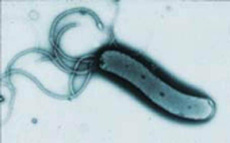Almost 100 percent of Russians infected with cancer bacterium
About two thirds of the planet's population hosts the bacterium in their stomachs
This year, Barry Marshall and Robin Warren from Australia won the 2005 Nobel Prize in Medicine/Psychology “for the discovery of Helicobacter pylori bacterium and the study of its role in causing gastritis and stomach ulcer.” Until recently, doctors insisted that peptic ulcers were basically the cause of stress and irregularity of living. 
The Australian researchers have proved that 90 percent of duodenum cancer and up to 80 percent of gastritis are caused by the bacterium Helicobacter pylori. About two thirds of the planet's population hosts the bacterium in their stomachs, but majority of people feel no symptoms because of it. Yeugeny Tkachenko says that Russia and Africa have registered one hundred percent of Helicobacter pylori invasion because of which people suffer from cancer, gastritis and peptic ulcers. At the same time, European Union countries fix no invasion of the bacterium at all.
Helicobacter pylori is a rather weak pathogen and may not manifest itself within a very long period of time. But peptic ulcers or stomach cancer begin to develop in case other risk factors, such as irregular nutrition, emotional stress and excess stomach acid add to the bacterium. People may catch the bacterium when hygiene regulations are ignored.
There is no exact statistics as concerning stomach ulcers in Russia. It is known that in the US, doctors register about 500,000 of primary and 4 million of relapse stomach ulcer every year. Doctors suppose that similar statistics is typical of Russia either.
The Nobel Prize Committee stated that thanks to the revolutionary discovery by Marshall and Warren peptic ulcers are no longer chronic diseases. Now the disease can be cured with antibiotics and acid secretion inhibitors.
Medicine sources of the 1980s doubted that bacteria might get settled in stomach because of the high hydrochloric acid concentration because of which all unwanted agents were destroyed. But it turned out that Helicobacter pylori is very enduring.
A human being is a natural host of Helicobacter pylori, but the infection can be also found with cats, non-anthropoid apes and pigs. The bacterium can be transmitted with infected drinking water or by eating raw vegetables that were watered with foul water while growing. Helicobacter pylori can survive for up to 2 weeks in cold sea and river water, Newsru wrote.
Subscribe to Pravda.Ru Telegram channel, Facebook, RSS!





